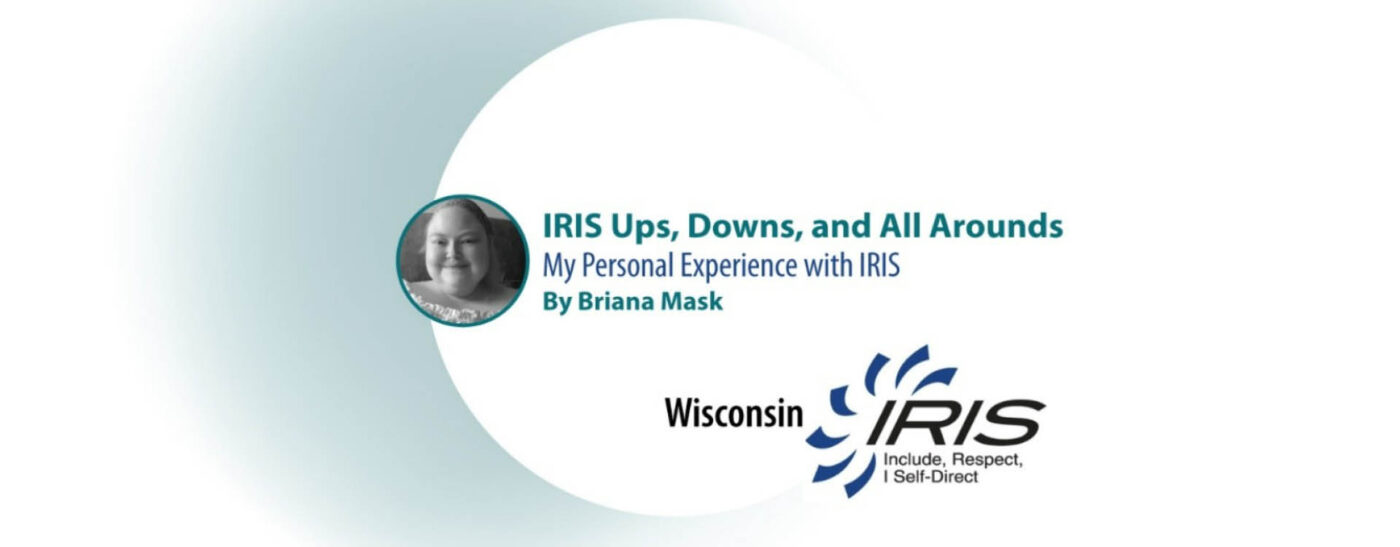My Personal Experience with IRIS
by Briana MaskHello there friend,
I’m Bree. I am a 32-year-old woman living with several disabilities such as lupus, gout, diabetes, and more. These conditions leave me with limited mobility, no immune system, chronic pain and fatigue, and memory and focus issues, just to name a few.
I’ve had these conditions since childhood, so I’ve become somewhat of an expert on how to manage my own care, and what I want to achieve. It’s a full-time job taking care of all my needs, but I still wanted to work and feel useful. That’s when I found IRIS! This program allows me to direct my own care, work, and still have the assistance I need.
Let me tell you some more about it!
IRIS (Include, Respect, I Self-Direct)
IRIS is a self-directed Medicaid program in Wisconsin for adults living with disabilities who wish to keep their freedom. This means that you make the choices for your care and lifestyle, with the support of various resources in the program.
The Wisconsin Department of Health Services (DHS) manages IRIS. They work with local agencies throughout the state to help you reach your life goals. These agencies support you to get set up with the resources and contacts you’ll need to manage your own care. As a participant, you become the employer for anyone who provides you with care.
You become the boss, so the work is completed the way you need it to be.
IRIS gives you a budget for goods, support, and services that will help you reach your long-term care goals. Your budget is based on your long-term needs and goals and decided through an assessment by DHS.
As an IRIS participant, you’re able to choose from a range of goods and services, including:
- skilled home nursing care
- supportive home care
- caregiver support and transportation
- employment support
- medical purchases
- and more...
My Personal Experience with IRIS
I have personally found this program to be immensely helpful in my life and have been a participant for a few years now. IRIS has allowed me to work part-time, focus on my health, and still be independent.
It is not all sunshine and rainbows, however, and I want to share with you some pros and cons I’ve experienced.
Pros
Participating in IRIS has given me:
- The ability to find, hire, manage, and direct my care givers and other support staff, including friends and family members.
- Resources to focus on my health.
- Independence and freedom to make my own choices.
- The ability to work part-time.
Cons
Enter, the negatives of the program. Some of the problems I have run into include, but are not limited to:
- A shortage of care workers.
- My own apprehension about a stranger coming into my home to assist with such personal tasks.
- The program does not provide enough compensation and benefits for support staff, making employee retention difficult.
- The task of finding a person and then managing staff falls directly on me.
Despite the drawbacks and my own anxieties, this program is overall a positive force in my life and has allowed me to remain independent, happy, and useful despite having a disability. The improvement in my mental health alone, being able to work part-time, and having the support I need is worth the frustrating parts!
Is IRIS for You?
Here are some things to consider before you decide if this is the correct program for you:
Eligibility
TO enroll in IRIS, you must:
- Live in Wisconsin
- Be at least 18 years old
- Meet certain financial and non-financial criteria
- Be eligible for Medicaid
- Be a frail elder or an adult with a disability
- Need the same level of care as someone in a nursing home
- Live in a home, apartment, adult family home, or residential care apartment complex
Cost
There is no cost to join IRIS, but there may be a monthly cost share.
A monthly cost share is determined based on your income and eligibility for Medicaid and IRIS. If you are required to pay a cost share, you’ll receive a monthly bill from IRIS. If this bill isn’t paid on time, you could be removed from the program.
Learn More About IRIS
The first step to learning more and enrolling in IRIS is to contact your local Aging and Disability Resource Center (ADRC) or Tribal Aging and Disability Resource Specialist (ADRS). They can help you find out if you are eligible and give details about your role and responsibilities when you are part of the program.

